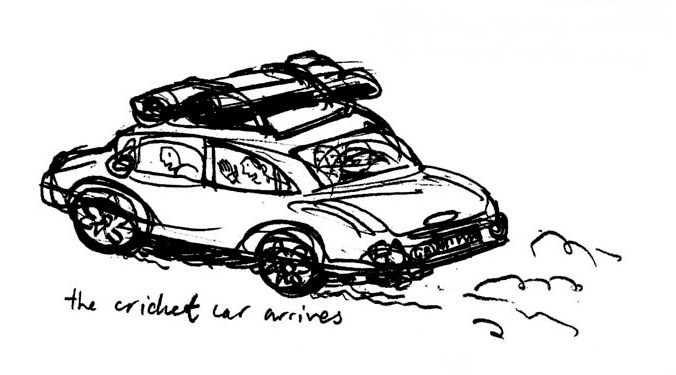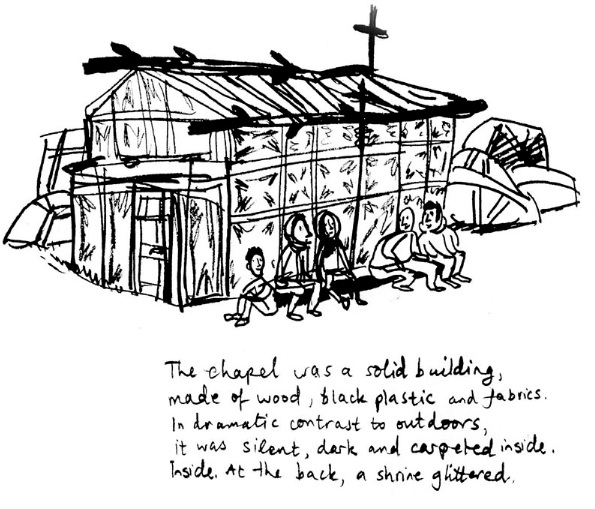Playing cricket with the Afghans

It doesn’t take long to get here. Dover is closer than you think.
The ferry crossing to Calais lasts only slightly longer than the time it takes to locate the food hall. Five minutes from the port, down quiet suburban streets and past huge water towers, there’s an anonymous-looking industrial estate. On one side of the road are an unlikely collection of buildings: a dog agility centre, a beer factory, a Hells Angels-style motorbike club headquarters.
And on the other side, their unwelcome neighbour: a vast, sprawling migrant camp.
Welcome to the Jungle.
It was curiosity that brought me here. The exuberant idealism of a solidarity mission quietened my usual cynicism, and, though I felt conflicted about it, I reasoned I ought at least to see the situation for myself.
I landed fresh from the ferry that morning feeling like a holidaymaker, spirits high from the journey and buoyed by the thought that our precious cargo of donations, our ‘flotilla of solidarity’ organised by UKHIP (the ‘UK Humanitarian Intervention Party’—cheerfully labelled ‘UKIP trolling activists’ by VICE magazine) would help in some small way to ease the enormous humanitarian crisis which is unfolding on our doorstep.
 Trying to be helpful
Trying to be helpful
Pulling up at the roadside, the people who massed around our cars asked if we were there to help. An eviction was imminent, and they were hurriedly abandoning the Jungle and moving their belongings a few miles away to a new camp.
Our van – full of tents, sleeping bags, clothes and food – would be more useful empty, ferrying people and their things up and down the road. So, though it seemed a shame not to be able to distribute the things ourselves, we took our donations to be stored elsewhere and set about trying to be helpful.
 For hours then, the vehicles ferried – back and forth, back and forth, the van’s back doors often butted open by another over-ambitious load (planks of wood, tent poles, pallets, bundles of clothes and blankets), each new journey an opportunity for a conversation – a fresh chance to hear the stories of who these people were, where they had come from, why they were here on this unforgiving coastline. Back at the camp, the two doctors in our group handed out health questionnaires; the photographer started snapping and the journalist got out her dictaphone.
For hours then, the vehicles ferried – back and forth, back and forth, the van’s back doors often butted open by another over-ambitious load (planks of wood, tent poles, pallets, bundles of clothes and blankets), each new journey an opportunity for a conversation – a fresh chance to hear the stories of who these people were, where they had come from, why they were here on this unforgiving coastline. Back at the camp, the two doctors in our group handed out health questionnaires; the photographer started snapping and the journalist got out her dictaphone.
 The cricket team arrived, as if from outer space, and there – amidst the ramshackle shelters and the piles of rubbish – a match played out, Afghanistan vs the UK. UKHIP’s marvellous, morale-boosting brainchild.
The cricket team arrived, as if from outer space, and there – amidst the ramshackle shelters and the piles of rubbish – a match played out, Afghanistan vs the UK. UKHIP’s marvellous, morale-boosting brainchild.

I sat in the awning of the camp’s church, a monument to human ingenuity in the face of unimaginable odds. A solid structure of wood and tarpaulin, warm inside and decked out with carpets and tinsel – details I didn’t see until later, revealed by my camera flash. Outside, the wind was bitter and one of the cricketers took off his coat and laid it over my legs.

This was a man who’d made the journey here from Kandahar, his mother, sister and two brothers dead at the hands of the Taliban, with little left but the clothes he was standing in, and yet he didn’t seem to even have to think about it. Over and over that day, though desperation hung in the air and tension was palpable from the upheaval, we were met with kindness, with handshakes and smiles and friendly conversation, and it humbled and shamed me in equal measure.
 I recognised then the insidiousness of the ‘us and them’ rhetoric. We’ve been taught to think of ‘migrants’ as an enemy, a terrifying unknown. We’ve created a distance, a gulf between us by abstracting them, neatly encasing them within inverted commas.
I recognised then the insidiousness of the ‘us and them’ rhetoric. We’ve been taught to think of ‘migrants’ as an enemy, a terrifying unknown. We’ve created a distance, a gulf between us by abstracting them, neatly encasing them within inverted commas.
But this doesn’t stand up when you meet migrants face to face. When you can put a name to that face: Aaron. Danny. Nauroz. When you learn of the crises they’ve fled, the arduous journeys they’ve made, to reach this far. Perhaps we’ve let ourselves forget that these are people too.
Later, over croque monsieurs and glasses of coke in a local café, we swapped stories about the people we’d met moving their meagre belongings. The 15-year-old boy who’d travelled here from Somalia, his family dead, alone in the world He had melted two of our party’s hearts, and they joked about smuggling him home in the boot of their car. The man who’d spent a bitter winter here trying to get across the Channel, who didn’t talk of ‘if’ he’d get to Britain, but ‘when’. They say that on a clear day in Calais, you can see the White Cliffs of Dover. What a taunt that must be.
We were only a few miles remove from these people, yet already the gulf seemed gigantic, the day’s contrasts extraordinary. Not long after we were on our way back again, joining the queue for the ferry, immigration officials barely glancing at our passports. I felt guilty for the ease with which we could spirit ourselves away from the squalid purgatory we’d found in Calais, and for the luxuries—warmth, shelter, security—which awaited us back home.

Nearly six months on, I am encouraged by signs of a growing solidarity movement with the migrants in Calais. In place of our single van, there are now frequent and substantial convoys, organised by groups like London2Calais, making the trip across the Channel. Finally it feels as if the gravity and scale of the migrant crisis has lodged in our public consciousness.
But as the situation in Calais worsens, I find myself wondering about the fate of the people I met back in March, living that reality day in, day out. I was recently given the number of Nauroz – my cricket-playing, coat-giving companion. He remembered me instantly (‘my friend!!’). When we tried to arrange a phone conversation, I apologised for not being able to talk that evening:
‘I’m afraid I’m going to be out tonight, but maybe tomorrow?’
‘Why you are afraid my friend? About what? How can I help you, Lucie?’
A simple misunderstanding. But, as on that windy spring day, I was still taken aback – bowled over by his selflessness, his indefatigable generosity of spirit. He didn’t even have to think about it.
The sketches are by Lucie’s sister, Dilly Boase – a painter and illustrator based in South London. You can see more of her work at www.dillyb.com







